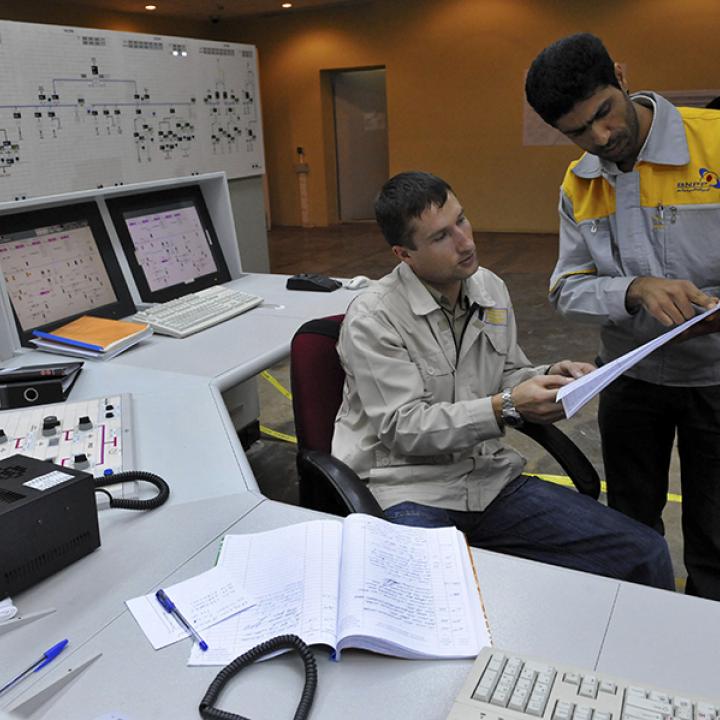
- Policy Analysis
- Articles & Op-Eds
Iran Nuclear Deal: Meeting vs. Exceeding U.S. Obligations

Washington shouldn't rush to resolve issues such as banking restrictions and heavy-water stockpiles without prodding Tehran to take helpful steps of its own.
Two recent announcements by the Obama administration regarding implementation of the Iran nuclear agreement have critics of the deal up in arms. The first is a proposal to relax or clarify U.S. financial restrictions on other countries' firms doing business with Iran. Details of this pending step are still obscure, and the benefits may ultimately prove modest. Iranian officials have complained that foreign banks remain reluctant to do business there though most sanctions have been lifted by the U.S., the European Union, the United Nations, and others. In short, they are unhappy that Iran has yet to realize what they believe should be the economic benefits of the nuclear deal.
Then came news that the Energy Department has agreed to purchase 32 metric tons of heavy water from Iran. Heavy water can be used in the production of fuel for nuclear weapons, though it also has scientific and industrial applications. As part of the deal announced last July, Iran agreed to redesign its heavy-water reactor and to limit its stockpile for 15 years.
Iran has had difficulty finding buyers for this material, and the U.S. purchase would help it keep to the limits prescribed by the nuclear agreement. State Department spokesman John Kirby said that removing the heavy water from Iran ensures it would be used for "research and non-nuclear industrial requirements." This defense raises the question of why Iran was permitted to continue producing such a sensitive material under the terms of the nuclear deal.
The purpose of both actions is straightforward: The Obama administration believes that the nuclear deal serves U.S. interests and, moreover, is a model for how similar disputes should be resolved. To ensure the deal's survival, the U.S. appears prepared to work with Iran's government -- which is facing attack from its own domestic critics who dislike the agreement -- even if, as in these instances, doing so involves going beyond Washington's explicit obligations in the nuclear deal.
The U.S. of course has an interest in being seen as a diplomatic partner that upholds its commitments. It's sensible to think that this country, Iran, and other parties should follow the letter of the agreement if they want it to last. Far more dubious is the idea that the U.S. has an obligation not just to comply with the agreement but also to ensure that Iran receives benefits it hoped for, or that doing so benefits the U.S. or Iranian moderates. That is not a notion that Iranian leaders -- who wave away concerns about missile tests and weapons imports -- would accept if applied to their country.
This beyond-the-agreement approach is unlikely to benefit U.S.-Iran relations or Iranian moderates in the long run. The challenges that Iran's banking system faces are largely of its own making (see PolicyWatch 2600, "Iran Locks Itself Out of the International Financial System While Blaming Washington"). Iranian banks do not comply with international financial standards to prevent money laundering or inhibit terrorist financing. Making it easier for Iran to avoid implementing such standards does no favors for economic reformers.
As for the heavy water, an alternative to selling it is halting production, a step that could make it more difficult for Iran to resume its related activity down the line. The need for this purchase also underscores the wastefulness of Iran pouring resources into its nuclear sector. That the U.S. is propping up Iran's government-operated nuclear industry while prohibiting trade with private entrepreneurs makes little sense if one's objective is to help reform-minded Iranians.
Obama administration officials often say that they successfully used a mix of sanctions and engagement to clinch the nuclear deal with Iran. Rather than rushing to resolve Iran's problems at no cost to Tehran, the administration could employ that same mix of disincentives and incentives in these and similar cases. Instead of offering additional concessions to help Iran realize the benefits of sanctions relief, U.S. officials could explain to Iran the steps it could take to ease other countries' concerns about its banking sector, and make new relief conditional upon implementation of those steps. The U.S. could also leave Iran to prove, by itself, that nuclear endeavors such as producing heavy water are economically viable, offering incentives to divest rather than preserve such enterprises. Iranian leaders might cry foul at such a harder-nosed approach, but it could nonetheless benefit Americans and Iranians both.
Michael Singh is the Lane-Swig Senior Fellow and managing director of The Washington Institute. This article originally appeared on the Wall Street Journal blog "Think Tank."
Wall Street Journal



